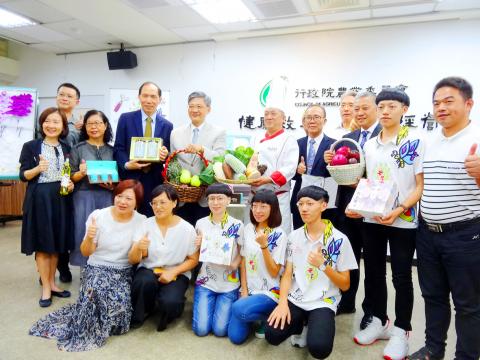A Council of Agriculture-led delegation is to travel to Moscow on Wednesday next week to take part in a two-day promotion of Taiwanese agricultural products.
Russia imports more than US$28 billion in agricultural produce, while yam exports to Russia could reach NT$300 per kilogram, the council said.
The quality of Taiwanese produce is undeniable, and while China, the US and Japan would remain the major export destinations for the nation’s agricultural products, the council is ready to develop a new market in Russia, as much of the produce grown in Taiwan is not found there, council Deputy Minister Chen Tien-shou (陳添壽) said.

Photo: CNA
Department of West Asian and African Affairs Director Ali Yang (楊心怡) at the Ministry of Foreign Affairs (MOFA) said that the number of Russian tourists visiting Taiwan last year increased by 85 percent, or 10,000 individuals, from 2017.
MOFA Commonwealth of Independent States Section Director Chao Shih-hsuan (趙世絢) said that more than 8,000 Russian tourists arrived in the first half of the year, and more are expected before the end of the year.
Russian commercial representatives were impressed with Taiwanese produce and enjoyed mangoes, wax apples and pineapples, Yang said.
They were able to take some mangoes with them when they returned home, after they were cleared by the Bureau of Animal and Plant Health Inspection and Quarantine, she said.
Russians really likes mangoes, council Department of International Affairs section official Tang Shu-hua (唐淑華) said.
Russia’s predominate crop is potatoes, largely due to that nation’s climate, and the majority of the fruits and vegetables available there are imported, Tang said.
Russia imported US$28 billion in agricultural produce in 2017, while fruit imports last year reached US$5 billion, Tang said.
There are buyers even when retail prices for imported sweet potatoes reach NT$300 per kilogram, while a cluster of Taiwanese grapes has sold for NT$6,000, showing that Russia is a promising market, Tang added.
Local agricultural unions said that they support the delegation’s trip, as there could be a market in Russia in the fall for Taiwanese cabbage.
Orchid growers are also hoping to develop a direct export market in Russia for moth orchids.
At present, Taiwanese moth orchids are sent to Netherlands and then exported to Russia, Taiwan Floriculture Exports Association executive director Chuang Ping-huang (莊炳湟) said.
Since such orchids are a high-value product, growers could earn a higher revenue if they could be shipped directly to Russia, Chuang said.
Chang Shu-yi (張淑逸), an official with the Ministry of Economic Affairs’ Bureau of Foreign Trade, said that about 20 Russian importers of tea, coffee and agricultural produce have been invited to next week’s promotion.
The bureau was also planning to invite representatives of Russian chain supermarkets to visit Taiwan in October, Chang said.

US climber Alex Honnold is to attempt to scale Taipei 101 without a rope and harness in a live Netflix special on Jan. 24, the streaming platform announced on Wednesday. Accounting for the time difference, the two-hour broadcast of Honnold’s climb, called Skyscraper Live, is to air on Jan. 23 in the US, Netflix said in a statement. Honnold, 40, was the first person ever to free solo climb the 900m El Capitan rock formation in Yosemite National Park — a feat that was recorded and later made into the 2018 documentary film Free Solo. Netflix previewed Skyscraper Live in October, after videos

NUMBERS IMBALANCE: More than 4 million Taiwanese have visited China this year, while only about half a million Chinese have visited here Beijing has yet to respond to Taiwan’s requests for negotiation over matters related to the recovery of cross-strait tourism, the Tourism Administration said yesterday. Taiwan’s tourism authority issued the statement after Chinese-language daily the China Times reported yesterday that the government’s policy of banning group tours to China does not stop Taiwanese from visiting the country. As of October, more than 4.2 million had traveled to China this year, exceeding last year. Beijing estimated the number of Taiwanese tourists in China could reach 4.5 million this year. By contrast, only 500,000 Chinese tourists are expected in Taiwan, the report said. The report

Temperatures are forecast to drop steadily as a continental cold air mass moves across Taiwan, with some areas also likely to see heavy rainfall, the Central Weather Administration (CWA) said. From today through early tomorrow, a cold air mass would keep temperatures low across central and northern Taiwan, and the eastern half of Taiwan proper, with isolated brief showers forecast along Keelung’s north coast, Taipei and New Taipei City’s mountainous areas and eastern Taiwan, it said. Lows of 11°C to 15°C are forecast in central and northern Taiwan, Yilan County, and the outlying Kinmen and Lienchiang (Matsu) counties, and 14°C to 17°C

STEERING FAILURE: The first boat of its class is experiencing teething issues as it readies for acceptance by the navy, according to a recent story about rudder failure The Hai Kun (海鯤), the nation’s first locally built submarine, allegedly suffered a total failure of stern hydraulic systems during the second round of sea acceptance trials on June 26, and sailors were forced to manually operate the X-rudder to turn the submarine and return to port, news Web site Mirror Daily reported yesterday. The report said that tugboats following the Hai Kun assisted the submarine in avoiding collisions with other ships due to the X-rudder malfunctioning. At the time of the report, the submarine had completed its trials and was scheduled to begin diving and surfacing tests in shallow areas. The X-rudder,